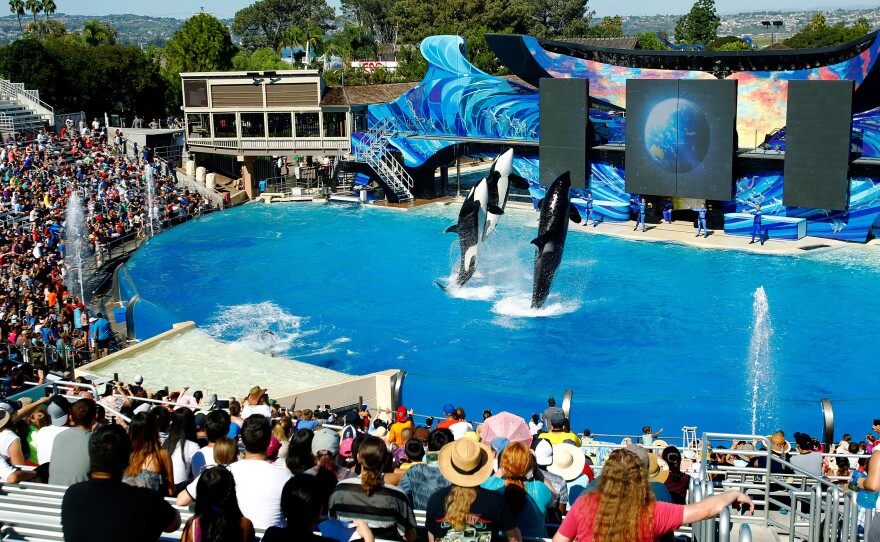Earlier this year seaworld made a dramatic announcement in addition to stopping its orca shows it announced an end to the breeding program. It intends to let the orca live out their lives at seaworld. Animal activists say there is a better solution. Transferring them to seaside sanctuaries. They announced a plan today. Joining me here is Heather Rally. Welcome to the program. High -- hello. Thank you for having me. Why isn't seaworld's plan to let the orca is required -- There is been some misconception around what was announced. Seaworld used this announcement that they are ending their breeding program as an example of their heating societies concerns. The reality is, they have actually derailed the original plans for the blue world project which was an initiative, they of derailed the project because they are no longer able to breed orcas to fill the larger tanks. The reality is that nothing will change about the life of these orcas . They have no intention of improving their enclosures. They have no intention of sanctuaries. They have intentionally tried to subvert our efforts to bring the scientific community together to discuss the possibility of a seaside sanctuary, that's the only way to alleviate the suffering. Heather, what is the lifespan of a killer whale? How long would they be expected to live in retirement at seaworld? As you may know, there is a calf who still has not been born. Animals who haven't been born yet may have an average of 50 years, or 70 years if it's a female. They often succumb to premature death by infectious disease, it's an unhealthy environment that we are subjecting them to. Evidence points to this. Some of these animals could die if we do not do something today. Today in San Diego, PETA announced the start of a seaside sanctuary project. What is that? In a seaside sanctuary we would be able to allow these animals to reconnect with their natural environment. These are far ranging animals, with incredible cognition and intelligence and complex social lives. They range all over the world from the Dick to the Antarctic, you've taken them out of the ocean and put them in a concrete swimming pool. It's in the -- unhealthy and deadly. What we would propose for their environment to improve their lives is to place them in a natural area that would be protected and managed. They would allow them to receive better care and to live out their lives in an environment where they can reconnect with who they really are. With living like an orca. Seaworld has responded to the call for C sanctuaries, it's statement reads that we have a very serious concerns about putting the animals in sea cages where they would be exposed to disease, pollution and other man-made and natural disasters. We think given the ages of our whales the length of time they spent and human care and the social relationships they have formed with other wheels, it would do them more harm than good. Could you respond to that, briefly. I think that we should tell that to the whales living in the ocean. The whales that live in the ocean, live longer than 70 years. We have an orca who is over 100 years old. You will never have an orca in captivity ever come anywhere near that age. I am out of time, I appreciate your being with us. The entire statement from seaworld will be on our website. I've been speaking with Heather rally.
Animal activists on Wednesday continued to call for what they believe is a better solution for SeaWorld's orcas: transferring the whales to seaside sanctuaries. People for the Ethical Treatment of Animals is holding a news conference in San Diego to announce a plan for seaside orca sanctuaries as part of its protest against SeaWorld.
"Orcas are sensitive, are intelligent, and lead complex emotional lives — and decades of deprivation have left these captive animals with psychological scars like those suffered by soldiers or victims of traumatic accidents and loss," PETA Senior Vice President Lisa Lange said in a statement. "There is a plan underway to create seaside sanctuaries where orcas and dolphins could find some relief from this constant pain, and PETA is calling on SeaWorld to make it happen now."
In response to PETA, SeaWorld spokesperson David Koontz emailed the following statement to KPBS Midday Edition:
"We have made a very significant pledge to make the current generation of orcas the last one and to end theatrical shows, and that's a far-reaching and bold commitment from our company. We have very serious concerns about putting the animals in sea cages, where they would be exposed to disease, pollution and other man-made and natural disasters. We also think that, given the ages of our whales, the length of time they've spent in human care and the social relationships they've formed with other whales, it would do them more harm than good. PETA's ideas are simplistic and don't take into account that the majority of the whales were born in human care and their plan could cause them immense stress and death during transport and release. Even if these issues didn't exist, we think the immense dollars needed for projects like that would be better spent, and help far more animals, if directed to our efforts with (The Humane Society of the United States) to fight commercial whaling, seal hunts and shark finning, among our other plans to help so many at-risk creatures. We invite PETA to join in those efforts."
In March, SeaWorld made a major announcement: In addition to stopping its orca shows in San Diego in 2017, it also said that the company will end its orca breeding program. It intends to let the orcas live out their lives at SeaWorld parks.
PETA wildlife veterinarian Heather Rally discusses the planned sanctuaries on Midday Edition on Wednesday.







